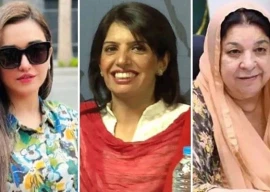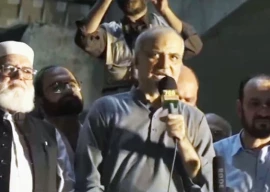Earlier this month, a week after leader Arvind Kejriwal, of the movement called India Against Corruption used RTI data to implicate Sonia Gandhi’s son-in-law Robert Vadra, in a real estate deal, the prime minister said: “There are some obvious areas of concerns about the way the Right to Information Act is being used presently... There are concerns about frivolous and vexatious use of the Act in demanding information the disclosure of which cannot possibly serve any public purpose.”
It would indeed be easy to read this as a reaction to the October 5 exposé of the growing pelf of Mr Vadra and his amazing dealings. But it must be conceded that the prime minister had occasion: it was at the seventh annual convention of the RTI law. But what does give cause for concern is his plan to restrict the operation of the law on grounds of protecting “personal privacy” of the citizen. “The citizens’ right to know should definitely be circumscribed if disclosure of information encroaches upon someone’s personal privacy.” However, in 2006, celebrating the first year of the RTI law, Mr Singh had held: “...the right to know is the most fundamental of all those rights, which are critical for upholding human dignity.” This is a different man speaking, a man tried and tired by governance.
Though he now allows that “where to draw the line is a complicated question”, his government is already moving on a new legislation, The Privacy Bill, to protect privacy. Prime Minister Singh and his Congress colleagues, who were out in full and furious form to protect Robert Vadra on television, have their task cut out. To start with, member countries of the United Nations unanimously resolved 60 years ago, to promote freedom of information as a fundamental human right. On the question of right to privacy, the Supreme Court of India has repeatedly held that while it is a fundamental right, it is subject to conditions and to be decided on a “case by case” basis; especially, in cases involving the public interest. What is Mr Singh’s real case here?
About a million RTI queries were filed before the Union government alone in the last year. This is empowerment and the citizens subscribe to it. Where is the man who had pleaded before parliament in 2005? “I have always believed — all power is a sacred societal trust — that you cannot sit on power, you have to spend it, but you must spend it taking into account the good of the largest number of people... I would only like to see that everyone, particularly our civil servants, should see the Bill in a positive spirit; not as a draconian law for paralysing the government, but as an instrument for improving government-citizen interface resulting in a friendly, caring and effective government functioning for the good of our people.” This is not even the man who said in 2008, at another RTI convention: “It is (a) revolutionary enactment that has placed huge powers in the hands of the ordinary citizen of the country to demand a transparent and accountable administration. This transition from a tradition of secrecy in official matters has of course not been easy. It has involved not only the setting up of an appropriate institutional mechanism but also a change in the mindset of public servants.” But all that these years of governance have done is to change the mindset of the prime minister.
Perhaps, this has something to do with private citizen Robert Vadra, after all. The Wikipedia entry on Mr Vadra shows a troubled and tragic family history, but he continues to retain his mysterious powers. An RTI reply from the ministry of home affairs shows he “has been granted exemption from pre-embarkation security checks at all civil airports in the country on the recommendation of this ministry as a special case as he is married to a SPG protectee, i.e. Smt Priyanka Vadra, in consultation with central security agencies (sic).”
The only other special case in that list comprising the President of India and other state dignitaries is the Dalai Lama.
Surely, Mr Vadra is not Mr Singh’s idea of the common man? At the first anniversary of the RTI law in 2006, this very same prime minister had said: “Mahatma Gandhi had once observed, ‘real Swaraj will come not by the acquisition of authority by a few, but by the acquisition of capacity by all to resist authority when abused.’ In many ways, I would like to think that the Right to Information Act...enable(s) us to fulfil to a considerable degree, Bapu’s dream... What is of particular satisfaction is that it has become clear that the citizens of our country have owned this Act with their arms wide open. This has become, if anything, a Peoples’ Law.” So what is the problem now?
Published in The Express Tribune, October 26th, 2012.
COMMENTS (6)
Comments are moderated and generally will be posted if they are on-topic and not abusive.
For more information, please see our Comments FAQ














@C. Nandkishore you are missing the crux of the matter .RTI is basically a tool invented to curb the corruption in govt sector,specially concerning bureaucratic bottlenecks and red tap-ism. representatives constitute really a small part rest of them concern babus and govt employees in their public capacity....and most of the times RTI has proved beneficial for a common man in his fight against corruption.example cited by you are exception rather than norms.any attempt to restrict RTI will kill its soul.
@C. Nandkishore: Your opinion that RTI act should not be abused to find out private and confidential information about individual citizens is certainly legitimate. If you look at sections 8j ,9, 11 of Chapter II of the act, it describes all exceptions to the need to provide information. Used judicially they can certainly serve the purpose you are suggesting. Here is a link http://rti.gov.in/rti-act.pdf (Warning - it appears that haphazardly cut pages have been scanned and uploaded, so the reading experience is not that pleasant).
While its advantages if put to right use can never be denied RTI is also a great boon for the trivia-seekers such as those that want to know more about airport checks & lounges & how to jump the Que. The zeal of the Author to trash Manmohan Singh is such that one is held in awe about the way he rests his entire column primarily on one sentence of wise counsel by Singh in a speech (not a policy statement in Parliament) regarding respect for the privacy of a citizen. Author connects it to Vadra & then brings up airport security. Security protocol is a matter for a specialist, which the Author is not. He quotes from the link leading to the reply under RTI about concession to Vadra at airports. He has however overlooked to quote completely. RTI reply has the following:- Quote: Shri Vadra has been exempted from pre-embarkation security checks at all civil airport only while travelling with SPG protectee.:Unquote. He gets the special consideration only rpt only when he is travelling with his wife. One may additionally demand information of earth-shaking importance such as names of spouses & children of such protectees that are extended the same treatment by the Agencies.
@C Nandkishore
My point exactly. I remember reading in one Indian newspaper that a parent has filled an RTI application to enquire about the marks granted to one of the class mates of their son.
As per the columnist a million quires have been filed. India does not have more than ten thousand elected representatives. Therefore the rest of the 9,90,000 must be about private citizens. These are being used to hound these private people. The RTI can be tremendously misused. For example anyone can demand to see the income tax returns of the columnist; how much has he been paid by ET, in dollars or rupees, whether he owns a house, how it was bought, etc. The columnist is no god to do no wrong. Somewhere in the past he is sure to have done some incorrect thing. If someone has a grudge against they will surely use it against him.
The Indian constitution was amended more than a hundred times. There is no wrong if RTI is amended to protect the private citizen.